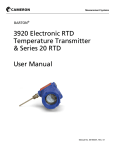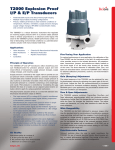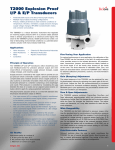Download GE DR-1500 Security Camera User Manual
Transcript
DR-1200/1500/1800/2000EX Rugged Dome Camera © 2002 Kalatel, a GE Interlogix company All Rights Reserved. Any GE Interlogix, Kalatel division, software supplied with GE Interlogix, Kalatel division, products is proprietary and furnished under license and can be used or copied only in accordance with the terms of such license. This document contains proprietary information that is protected by copyright. No part of this document may be reproduced or transmitted in any form or by any means without the prior written permission of GE Interlogix, Kalatel division. The information contained in this document is subject to change without notice. GE Interlogix, Kalatel division, in keeping pace with technological advances, is a company of product innovation. Therefore, it is difficult to ensure that all information provided is entirely accurate and up-to-date. GE Interlogix, Kalatel division, accepts no responsibility for inaccuracies or omissions and specifically disclaims any liabilities, losses, or risks, personal or otherwise, incurred as a consequence, directly or indirectly, of the use or application of any of the contents of this document. This equipment has been tested and found to comply with the limits for a Class A digital device, pursuant to part 15 of the FCC Rules. These limits are designed to provide reasonable protection against harmful interference when the equipment is operated in a commercial environment. This equipment generates, uses, and can radiate radio frequency energy and, if not installed and used in accordance with the instruction manual, may cause harmful interference to radio communications. You are cautioned that any changes or modifications not expressly approved by the party responsible for compliance could void the user's authority to operate the equipment. For the latest product specifications, visit GE Interlogix, Kalatel division, online at www.kalatel.com or contact your Kalatel sales representative. For technical support before and after installation, call 800-469-1676. Technical support is available 24 hours a day, 7 days a week. Call: Fax: Web: Tech Support Tech Support Main Tech Support Main www.kalatel.com 1038346B / February 2003 800-469-1676 (6 A.M. – 5 P.M. PST Monday through Friday) 541-740-3589 (all other times) 800-343-3358 or 541-754-9133 541-752-9096 (available 24 hours a day) 541-754-7162 Rugged Dome Camera Installation Manual Table of Contents TABLE OF CONTENTS BEFORE YOU BEGIN ............................................................... 4 1 PREPARING THE HOUSING AND CAMERA ............................ 5 1.1 RETROFITTING WITH THE UTP MODULE ...................... 6 2 MOUNTING THE UNIT ......................................................... 8 2.1 SURFACE-MOUNTING THE HOUSING ........................... 9 2.2 FLUSH-MOUNTING THE HOUSING.............................. 11 2.3 USING PENDANT- AND WALL-MOUNT BRACKETS ....... 13 3 MAKING CABLE CONNECTIONS ........................................ 15 3.1 COAXIAL CABLE ...................................................... 15 3.2 UTP CABLE............................................................ 15 4 ADJUSTING THE CAMERA ................................................ 16 4.1 FOCUS ................................................................... 16 4.2 PHASE ADJUSTMENT ............................................... 16 4.3 AUTO IRIS LENSES .................................................. 18 4.4 SETTING THE DAY/NIGHT CAMERA SWITCH LEVEL ..... 19 5 CLOSING THE HOUSING ................................................... 20 1038346B / February 2003 3 Before You Begin Rugged Dome Camera Installation Manual BEFORE YOU BEGIN Read these instructions before installing or operating this product. Note: This installation should be made by a qualified service person and should conform to local codes. This manual provides installation and operation information. To use this document, you must have the following minimum qualifications: • A basic knowledge of CCTV systems and components • A basic knowledge of electrical wiring and low-voltage electrical hookups Use this product only for the purpose for which it was designed. Customer Support For assistance in installing, operating, maintaining, and troubleshooting this product, refer to this document and any other documentation provided. If you still have questions, contact Kalatel Technical Support: GE Interlogix, Kalatel division Call: 800-469-1676 Fax: 541-752-9096 Note: You should be at the equipment, ready with details before calling Technical Support. Conventions Used in this Manual Boldface or button icons highlight command entries. The following WARNING, CAUTION, and Note statements identify potential hazards: * WARNING: Improper use of this equipment can cause severe bodily injury or equipment damage. ** CAUTION: Improper use of this equipment can cause equipment damage. Note: Notes contain important information about a product or procedure. * This symbol indicates electrical warnings and cautions. ** This symbol indicates general warnings and cautions. 4 1038346B / February 2003 Rugged Dome Installation Manual 1 Preparing the Housing and Camera PREPARING THE HOUSING AND CAMERA Using the provided Allen wrench, loosen the tamper-resistant housing cover screws. • If your unit has the factory-installed flying lead with coaxial video cable, proceed to section 2 to mount the unit. • If your unit has the factory-installed UTP module, ensure that the jumpers illustrated in Figure 2 are disconnected. Then proceed to section 2 to mount the unit. • To retrofit your unit with the UTP module, proceed to section 1.1. See Figure 1 during the installation process. Back conduit entry Side conduit entry Inner plate mounting holes (3) Flying lead PC assembly Camera UTP module mounting post Figure 1. Interior of housing 1038346B / February 2003 5 Preparing the Housing and Camera 1.1 Rugged Dome Installation Manual RETROFITTING WITH THE UTP MODULE To put the unit in UTP mode see Figure 2 and perform the following. 1) Disconnect the flying lead from the PC assembly and remove it from the housing. 2) Disconnect the jumpers on the PC assembly. Connected jumpers Disconnected jumpers Figure 2. Disconnecting jumpers on the PC assembly to enable the UTP module 6 1038346B / February 2003 Rugged Dome Installation Manual Preparing the Housing and Camera To install the UTP module see Figure 3 and Figure 4 and perform the following. M3.5x3 fillisterhead screw Figure 3. Inserting the mounting screw into the UTP module 1) Insert the M3.5x3 fillister-head mounting screw into the middle right hole of the module. 2) Screw the UTP module onto the UTP module mounting post (Figure 1) in the housing. Connection to the PC assembly Cable to terminal board Unshielded twisted-pair module Figure 4. Installing and connecting unshielded twisted-pair module. 3) Attach the UTP cable to the PC assembly. 1038346B / February 2003 7 Mounting the Unit 2 Rugged Dome Installation Manual MOUNTING THE UNIT Cables should be prepared and accessible at the mounting location. Figure 5. Surface-mount Figure 6. Flush-mount To surface-mount the housing see section 2.1. To flush-mount the housing see section 2.2. Pendant mount 3/4-in. pipe NPT (not provided) Extended pendant mount Wall mount Figure 7. Pendant- or wall-mount brackets To mount the unit on a pendant- or wall-mount bracket see section 2.3. 8 1038346B / February 2003 Rugged Dome Installation Manual 2.1 Mounting the Unit SURFACE-MOUNTING THE HOUSING To surface-mount the housing, see Figure 8 and perform the following. Mounting surface Anchors Outer plate Inner plate M4x20 truss-head tapping screws (3) M4x12 pan-head double-washer screws (3) (through housing base) Figure 8. Surface-mounting the housing Note: Feed the cables through the mounting surface, plates, and housing at the appropriate time depending on whether you are using the flying lead and whether the cable is external or internal to the mounting surface. To prepare the mounting surface perform the following. 1) Position the outer plate on the mounting surface at the installation location. 2) Trace the position of the mounting holes. 3) If you are using the back cable entry, trace its outline. 4) Drill the outlined mounting holes. 1038346B / February 2003 9 Mounting the Unit 5) Rugged Dome Installation Manual If necessary, cut out the outlined back cable entry hole. To mount the outer plate, perform the following. 1) Install the provided mounting anchors in the mounting holes. 2) Mount the plates to the anchors in the mounting surface using the M4x20 truss-head tapping screws. To install the housing perform the following. 1) Let the housing cover drop down and rest on the hinge. 2) Attach the housing to the inner plate using the M4x12 pan-head double-washer screws. 3) Line up the opening of the mounting slots on the inner plate with the M4x20 truss-head tapping screws holding the outer plate in place. 4) Rotate the housing counterclockwise to slide the mounting slots onto the screws and secure the unit. To make cable connections, see section 3. 10 1038346B / February 2003 Rugged Dome Installation Manual 2.2 Mounting the Unit FLUSH-MOUNTING THE HOUSING To flush-mount the housing, see Figure 9 and perform the following. Back plate Ceiling panel Outer plate Inner plate M5x20 pan-head double-washer screws (3) M4x12 pan-head double-washer screws (3) (through housing base) Figure 9. Flush-mounting the housing Note: Feed the cables through the ceiling panel, plates, and housing at the appropriate time depending on whether you are using the flying lead and whether the cable is external or internal to the mounting surface. To prepare the ceiling panel perform the following. 1) Remove the ceiling panel from the ceiling. 2) Position the back of the outer plate on the ceiling panel at the installation location. 1038346B / February 2003 11 Mounting the Unit Rugged Dome Installation Manual Note: Ensure that you trace the back of the outer plate: this is the side with the smaller diameter. If you trace the diameter of the front of the plate, your mounting hole will be too large. 3) Trace the outline of the back of the outer plate onto the ceiling panel. 4) Use the traced outline as a guide to cut out the mounting hole. To install the back and outer plates perform the following. 1) From the inside of the back plate, insert the three M5x20 pan-head double-washer screws into the three holes. Note: The screws should be secure but they should not protrude out the back of the plate. 2) Set the back plate onto the back of the ceiling panel and center it over the mounting hole. 3) Slide the outer plate into the mounting hole and back plate. 4) Line up the mounting holes and slots in the outer plate with the three M5x20 pan-head double-washer screws in the back plate. 5) Slide the outer plate onto the screws in the back plate. 6) Rotate the outer plate counterclockwise to secure it to the back plate. To install the housing perform the following. 1) Let the housing cover drop down and rest on the hinge. 2) Attach the housing to the inner plate using the M4x12 pan-head double-washer screws. 3) Slide the back of the housing and attached inner plate into the outer plate. 4) Rotate the housing counterclockwise to slide the mounting slots on the inner plate onto the screws in the back plate. To make remaining cable connections, see section 3. 12 1038346B / February 2003 Rugged Dome Installation Manual 2.3 Mounting the Unit USING PENDANT- AND WALL-MOUNT BRACKETS To install the housing on pendant-mount, extended-pendant-mount, or wall-mount brackets, perform the following. Note: The extended-pendant-mount bracket is extended with a piece of installer-provided 3/4-inch (1.9 cm) pipe that has standard NPT threads. The extension should be in the bracket before performing the installation procedure. Note: Feed the cables through the mounting surface, bracket, and housing at the appropriate time depending on whether you are using the flying lead and whether the cable is external or internal to the mounting surface. To prepare the mounting surface perform the following. 1) Using the bracket surface as a template, mark the mounting holes on the mounting surface. 2) Drill the mounting holes and a pass-through hole for the camera cables. 3) Secure the bracket to the mounting surface with the provided screws and anchors. To install the housing into the bracket see Figure 10 and perform the following. Pendant or wall-mount bracket Mounting screws (3) (through housing base) Figure 10. Installing the housing into the bracket 1038346B / February 2003 13 Mounting the Unit Rugged Dome Installation Manual 1) Remove the three mounting screws from the pendant of the mounting bracket. 2) Let the housing cover drop down and rest on the hinge. 3) Feed the cables through the bracket. 4) Slide the housing into the pendant of the mounting bracket. 5) Line up the three holes on the bottom of the housing with the three corresponding holes in the bracket. 6) Attach the housing to the bracket using the three mounting screws. To make cable connections, see section 3. 14 1038346B / February 2003 Rugged Dome Installation Manual 3 Making Cable Connections MAKING CABLE CONNECTIONS To make cable connections using the flying lead with coaxial cable see section 3.1. To make cable connections using UTP see section 3.2. 3.1 COAXIAL CABLE To make remaining cable connections see Figure 11. Coaxial video out Power (12 VDC or 24 VAC) Figure 11. Camera cables 3.2 UTP CABLE To make the remaining power cable connections see Figure 12. Push terminals Video ground Video out Power – Power + UTP module connection Jumpers disconnected to engage UTP module Figure 12. Cable connections to the PC assembly 1038346B / February 2003 15 Adjusting the Camera 4 Rugged Dome Installation Manual ADJUSTING THE CAMERA To adjust the camera focus see section 4.1. To make phase adjustments see section 4.2. To make auto-iris lens adjustments see section 4.3. 4.1 FOCUS 1) Loosen the zoom ring thumbscrew. 2) Turn the zoom ring to set the desired zoom. 3) Tighten the zoom ring thumbscrew. 4) Loosen the focus ring thumbscrew. 5) Turn the focus ring to set the desired focus. Note: To keep the camera in focus, you might have to adjust the focus ring while you tighten the thumbscrew. 6) 4.2 Tighten the focus ring thumbscrew. PHASE ADJUSTMENT Phase adjust up Phase adjust down Figure 13. Adjusting the line-lock phase on the PC assembly 16 1038346B / February 2003 Rugged Dome Installation Manual Adjusting the Camera CAUTION: The phase adjustment must be made by a qualified service person or installer. Line-lock is automatic when the camera is connected to a 24 VAC power supply. If two cameras are connected to different AC supplies with different phases, the cameras can be synchronized. Synchronize the cameras by using a dual-trace oscilloscope to observe the video output signal (V-rate) of the camera and by adjusting the line-lock phase control buttons to line up the phases of both signals, or by using a KTS-56 V-Phase Adjustment Tool. Adjust the line-lock phase by pressing the line-lock phase adjust buttons on the PC assembly (Figure 13). 1038346B / February 2003 17 Adjusting the Camera 4.3 Rugged Dome Installation Manual AUTO IRIS LENSES For auto iris lenses, use an insulated adjustment tool to adjust the DC level with the blue pot on the PC assembly (Figure 14). Proper adjustment will ensure the correct exposure depending on the camera’s situation and the lighting levels. To set the light level at which the camera switches between daylight and IR mode, see Figure 14 and perform the following. DC auto iris level adjustment pot Figure 14. Adjusting the DC level on the PC assembly • For brighter light conditions, turn the DC auto iris level adjustment pot counterclockwise. • For lower light conditions, turn the DC auto iris level adjustment pot clockwise. 18 1038346B / February 2003 Rugged Dome Installation Manual 4.4 Adjusting the Camera SETTING THE DAY/NIGHT CAMERA SWITCH LEVEL The Day/Night Rugged Dome includes a lens that provides a true-color picture during daylight hours. The camera includes a photocell that detects when low-light levels occur and, with the removal of a filter from the lens, instigates infrared (IR) operation. IR operation provides a true black and white picture during low light conditions. To set the light level at which the camera switches between daylight and IR mode, see Figure 15 and perform the following. Photocell H/L Adjustment Figure 15. Day/Night camera components • To make the switch to IR operation occur during brighter light conditions, turn the H/L adjustment switch counterclockwise. • To make the switch to IR operation occur during lower light conditions, turn the H/L adjustment switch clockwise. Make all other adjustments to the Day/Night camera as instructed for non-Day/Night cameras in sections 4.1, 4.2 and 4.3. 1038346B / February 2003 19 Closing the Housing 5 Rugged Dome Installation Manual CLOSING THE HOUSING Shut the housing cover and use the provided Allen wrench to tighten the housing cover screws. Ensure that the cover is tightened securely to maintain the unit’s IP66 ratings. 20 1038346B / February 2003

































